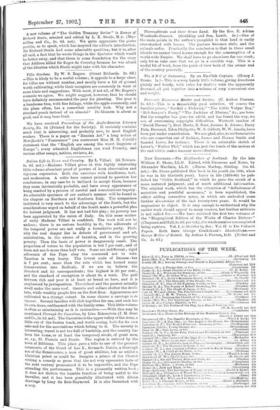Italian Life in Town and Country. By L. Villari. (G.
Newnes. 3s. 6d. net.)—Madame Villari gives in this highly interesting little volume abundant proof of powers of keen observation and vigorous expression. Both she exercises with kindliness, tact, and moderation. A critic here cannot pretend to question her conclusions; in any case he is inclined to accept them, because they seem intrinsically probable, and have every appearance of being reached by a process of careful and conscientious inquiry. An admirable specimen of our author's manner will be found in the chapter on Northern and Southern Italy. The comparison instituted is very much to the advantage of the North, but the considerations urged on behalf of the South make a powerful plea for lenient judgment. It has not had fair play ; its poverty has been aggravated by the union of Italy. On this same matter of unity Madame Villari is confident. The work will not be undone ; there is no serious hostility to it; the adherents of the temporal power are not really a formidable party. Prob- ably the real danger lies in defects of government and ad- ministration, in the excess of taxation, and in the growing poverty. Then the basis of power is dangerously small. The proportion of voters to the population is but 7 per cent., and of these not much more than half vote. Some are indifferent ; rigid adherents of the Pope obey the command not to vote. Taxation is very heavy. The lowest scale of Income - tax is 7 per cent., more than the rate which has turned many Conservatives into Radicals, if we are to believe the Standard and its correspondents ; the highest is 20 per cent., and the standard of exemption is about 9s. a week. The gulf between rich and poor is at least as broad as here, and it is emphasised by juxtaposition. The richest and the poorest actually dwell under the same roof. Garrets and cellars shelter the desti- tute, while wealthy people live on the first floor. Appearances are cultivated to a strange extent. In some classes a carriage is de rigueur. Several families will club together for one, and each has its own doors, emblazoned with the family arms. This little volume is often as entertaining as it is instructive.—With this may be mentioned Through the Cosentino, by Lina Eckenstein (J. M. Dent and Co., 3s. 6d. net). The Casentino is the upper valley of the Arno, a little out of the beaten track, and worth seeing, both for its own sake and for the associations which belong to it. The scenery is interesting, travel is not too full of hardship, and the country has been the home, or at least the temporary abode, of great men, as, e.g., St. Francis and Dante. The region is entered by the town of Bibbiena". This place gave a title to one of the greatest ornaments of the Court of Leo X., Bernardo Duizio, a thorough son of the Renaissance, a man of great abilities, but as unlike a Christian priest as could be. Imagine a prince of the Church writing a comedy so gross that the not very squeamish taste of the next century pronounced it to be impossible, and the Pope a Winding the performance. This is a pleasantly written book ; it does not disdain the humble function of being useful to the traveller, and it has been gracefully illustrated with fifteen drawings by Lucy du Bois-Raymond. It is also furnished with a map.










































 Previous page
Previous page